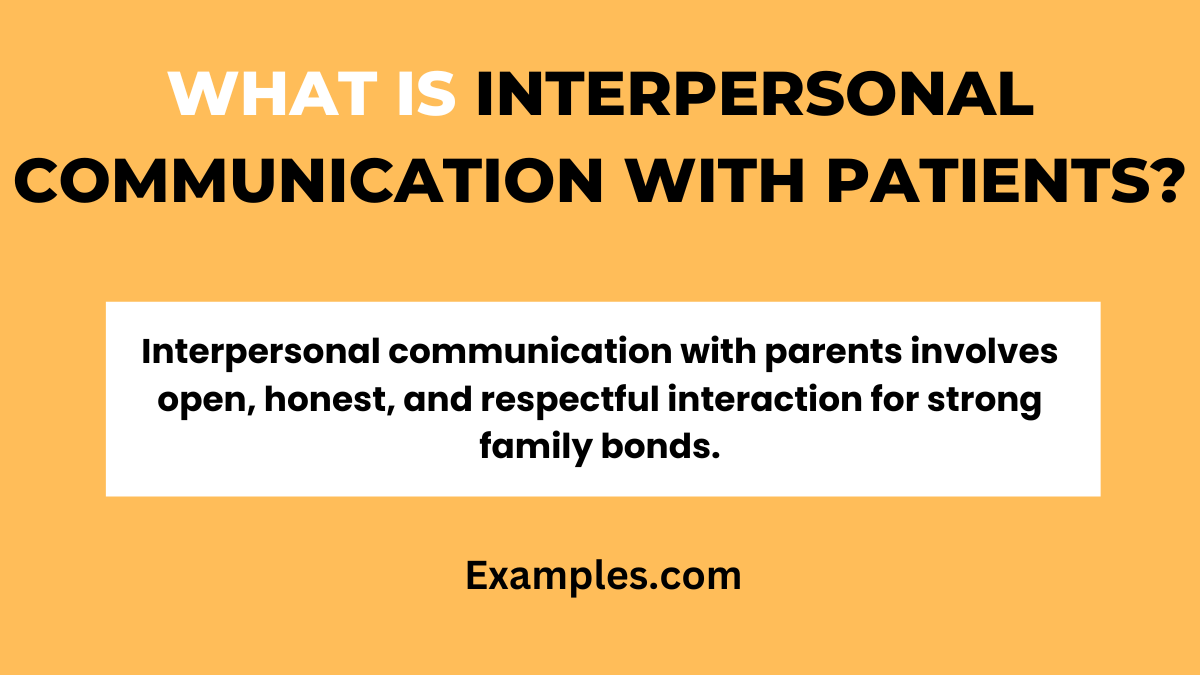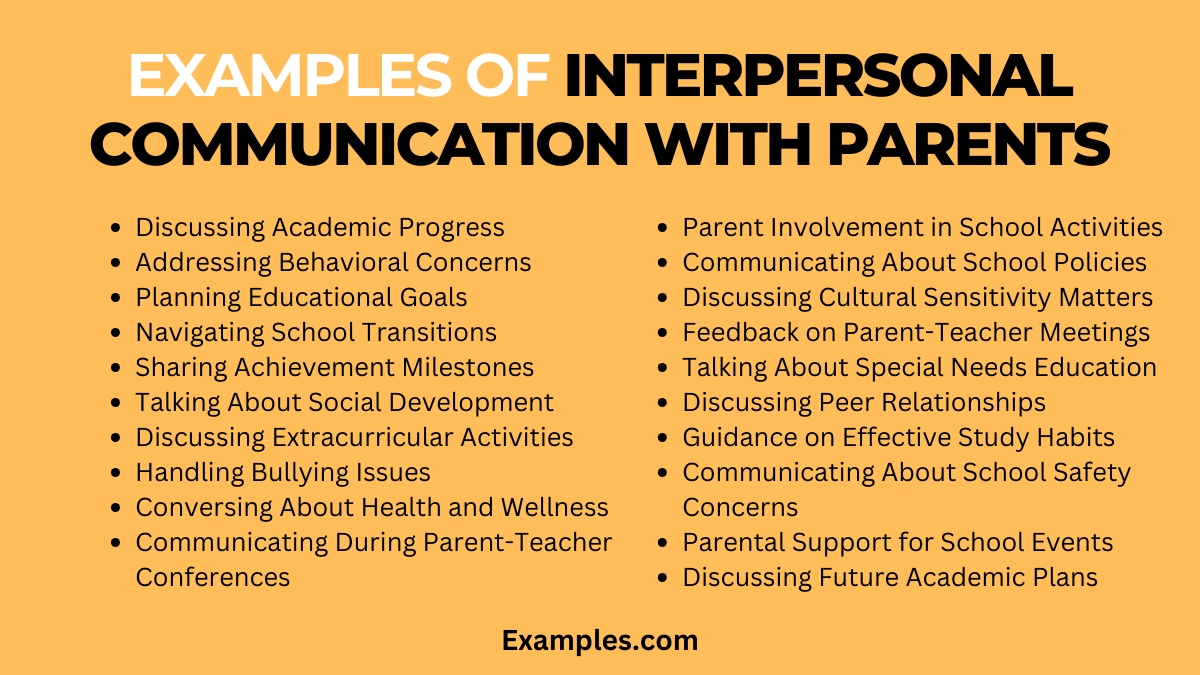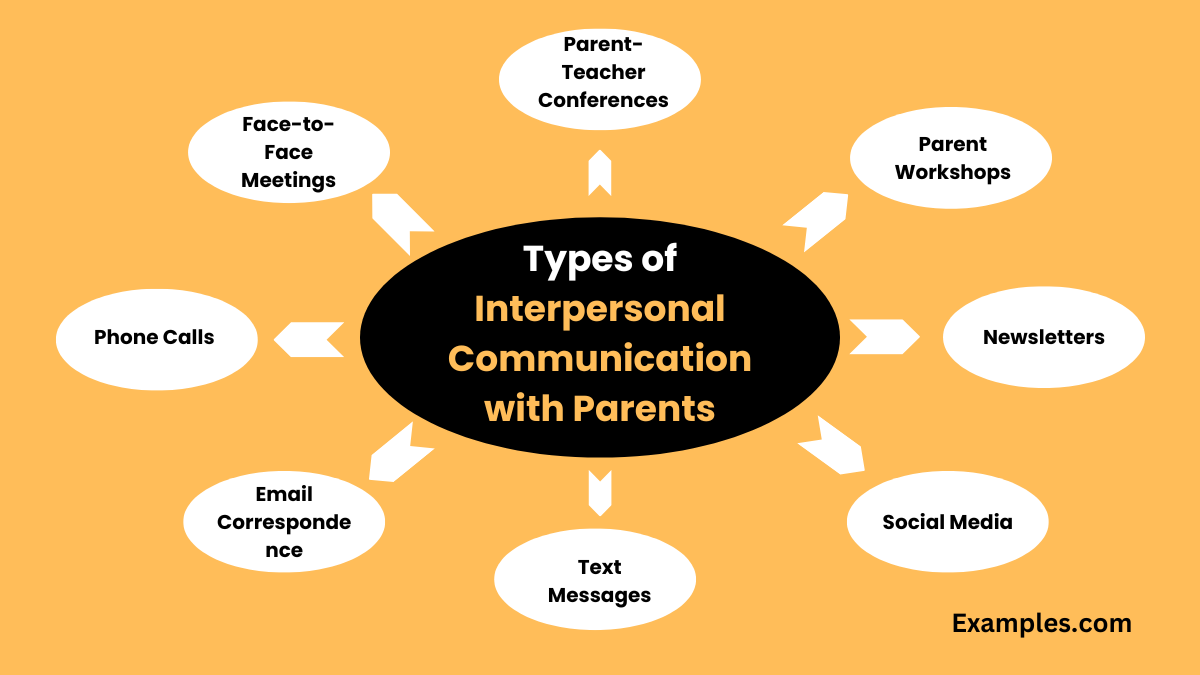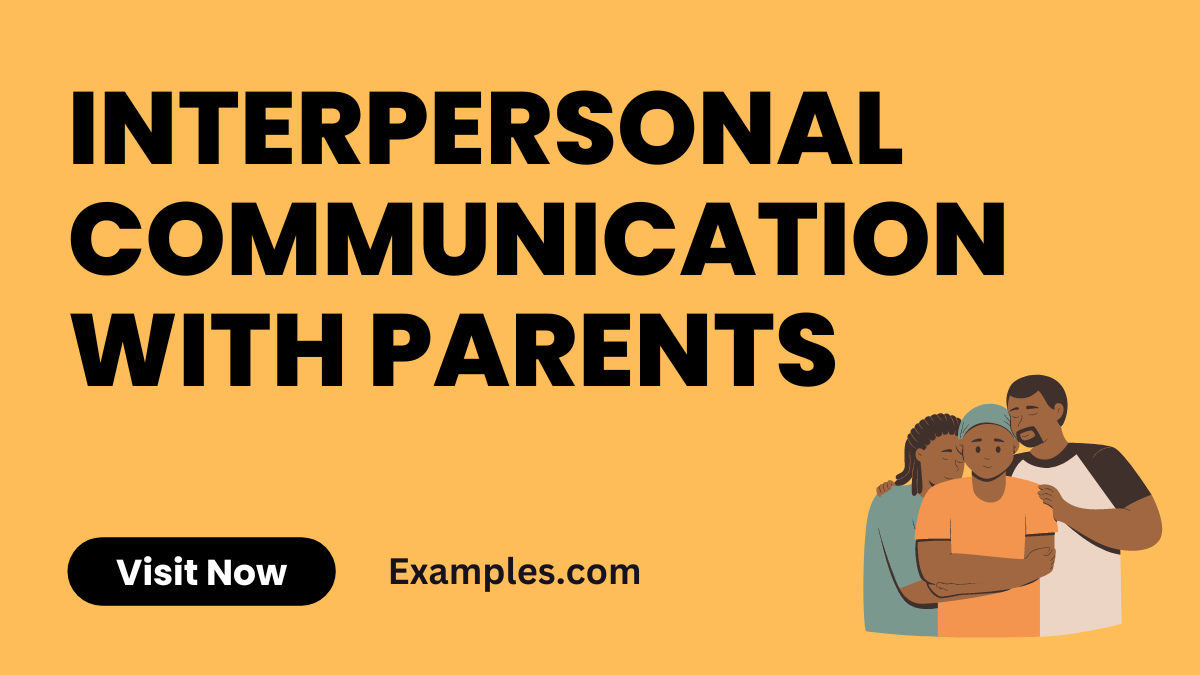14+ Interpersonal Communication with Parents Examples
Interpersonal communication with parents is crucial in nurturing a strong, healthy family relationship. This comprehensive guide, enriched with practical communication examples, offers invaluable tips and insights on effectively conversing with parents. Whether it’s discussing daily matters or addressing sensitive topics, the guide provides strategies to improve understanding, respect, and empathy in family communication. Emphasizing the importance of active listening, clear expression, and emotional intelligence, this guide is a vital resource for anyone seeking to enhance their communication skills within the family.
What is Interpersonal Communication with Parents?

Interpersonal communication with parents refers to the way children and their parents talk and interact with each other. It’s not just about the words used, but also how they’re said, the emotions involved, and the understanding each party has. Good communication with parents includes listening, sharing thoughts and feelings honestly, and respecting each other’s views. It plays a crucial role in building strong, trusting family relationships.
15 Examples of Interpersonal Communication with Parents

- Expressing Gratitude: Show appreciation for your parents’ efforts and support.
Example: “I really appreciate everything you do for me.” - Active Listening: Give your full attention when your parents are speaking.
Example: “I make sure to listen carefully and understand what you’re saying.” - Regular Check-Ins: Make time for regular conversations to stay connected.
Example: “Let’s have our weekly catch-up to share what’s going on in our lives.” - Respectful Disagreements: Learn to disagree respectfully without escalating conflicts.
Example: “I understand your point, but here’s my perspective.” - Sharing Personal Experiences: Open up about your life experiences and feelings.
Example: “I want to share what happened at school today.”

- Seeking Advice: Ask for their opinions and advice on various matters.
Example: “I value your advice. What do you think I should do?” - Empathetic Responses: Show empathy towards their feelings and concerns.
Example: “I can see why that worries you. Let’s talk about it.” - Setting Boundaries: Communicate your personal boundaries clearly.
Example: “I need some space when I’m working on my projects.” - Using Humor: Lighten conversations with appropriate humor.
Example: “I added a bit of humor to make our chat more relaxed.” - Problem-Solving Together: Collaborate to solve problems or make decisions.
Example: “Let’s figure out a solution together.” - Acknowledging Mistakes: Admit and apologize for any mistakes.
Example: “I was wrong in what I did, and I’m sorry.” - Clarifying Misunderstandings: Clear up any confusion or misunderstandings promptly.
Example: “I want to clarify what I meant earlier.”

- Positive Reinforcement: Acknowledge and praise their positive actions.
Example: “I really appreciate your help with my project.” - Discussing Future Plans: Talk about your aspirations and plans for the future.
Example: “I’d like to discuss my plans for college with you.”

- Cultural Sensitivity: Be aware and respectful of cultural differences.
Example: “I respect our cultural traditions and how they influence our communication.”
Interpersonal Communication in the Family
- Building Trust: Open and honest communication fosters trust among family members, crucial for a healthy family dynamic.
- Resolving Conflicts: Effective interpersonal communication helps resolve disputes amicably, maintaining harmony in the family.
- Strengthening Bonds: Regular, meaningful conversations strengthen emotional connections between family members.
- Expressing Emotions: Families that communicate well can express and understand each other’s emotions better, leading to deeper empathy.
- Providing Support: Good communication enables family members to offer support during challenging times.
- Setting Boundaries: Clear communication helps in setting and respecting personal boundaries within the family.
- Decision Making: Collective decision-making becomes easier with open communication, ensuring everyone’s views are considered.
- Modeling Behavior: Parents who communicate effectively set a positive example for their children, teaching them valuable communication skills.
Why is Interpersonal Communication Important Among Parents and Children?
- Fostering Understanding: Clear communication helps parents and children understand each other’s perspectives and needs.
- Encouraging Openness: Children are more likely to share their experiences and problems when communication channels are open.
- Guiding and Mentoring: Effective communication allows parents to guide and mentor their children appropriately.
- Building Self-Esteem: Positive and affirming communication boosts children’s self-esteem and confidence.
- Teaching Life Skills: Through communication, parents can teach children important life skills and values.
- Preventing Misunderstandings: Regular and clear communication can prevent misunderstandings and misconceptions.
- Enhancing Emotional Health: Good communication contributes to better emotional health and well-being for both parents and children.
- Creating a Supportive Environment: Open communication creates a supportive and nurturing family environment.
Tips / Ways to Communicate with Parents
- Active Listening: Show genuine interest in what parents are saying. Reflect back what you’ve heard to confirm understanding.
Example: “I understand your concern about your child’s progress. Let’s discuss how we can work together to support them.” - Empathy: Put yourself in the parents’ shoes and respond with sensitivity.
Example: “I can see how this situation might be worrying for you. Let’s find a solution together.” - Clear and Concise Messages: Be clear and straightforward in your communication to avoid misunderstandings.
Example: “The school will be hosting a parent-teacher meeting next Thursday to discuss student performance.” - Regular Updates: Keep parents informed about their child’s progress and any relevant events.
Example: “I wanted to update you on how well your child did in their science project.” - Use of Positive Language: Focus on strengths and positive aspects to build a constructive dialogue.
Example: “Your child shows great enthusiasm in class discussions, which is wonderful to see.” - Non-Verbal Cues: Be aware of your body language; it should be open and welcoming.
Example: “I always maintain eye contact and nod to show I am listening during parent meetings.” - Email Communication: Use emails for detailed messages or when in-person meetings are not possible.
Example: “I’ve sent you an email with the details of the curriculum changes for your review.” - Setting Boundaries: Politely set boundaries about appropriate times and methods for communication.
Example: “I’m available for calls or meetings during my office hours from 10 am to 12 pm.” - Offering Support and Resources: Provide resources or suggestions that can help parents support their child’s learning.
Example: “Here are some reading materials that can help you assist your child with their homework.” - Encouraging Parental Involvement: Invite parents to participate in school activities and decision-making.
Example: “We encourage you to attend the school fair next month to support our students.”
Types of Interpersonal Communication with Parents

- Face-to-Face Meetings: Personal meetings provide a direct way to engage and build rapport.
Example: “During our meeting, we discussed strategies to support your child’s learning journey.” - Phone Calls: Useful for quick updates or when immediate feedback is needed.
Example: “I called to inform you about your child’s achievement in the math competition.” - Email Correspondence: Effective for sending detailed information and maintaining a record of communication.
Example: “I’ve emailed the schedule for the upcoming parent-teacher conferences.” - Text Messages: Convenient for sending brief updates or reminders.
Example: “Reminder: Tomorrow is the deadline for the science fair submissions.” - Social Media: Platforms like school Facebook groups can be used for general announcements.
Example: “We’ve posted updates about the school sports day on our Facebook page.” - Newsletters: Regular newsletters can keep parents informed about school events and news.
Example: “Our monthly newsletter includes highlights from our school’s cultural fest.” - Parent Workshops: Hosting workshops can be a way to engage and educate parents.
Example: “We’re conducting a workshop on digital literacy for parents next week.” - Parent-Teacher Conferences: Formal meetings focused on discussing the child’s progress and needs.
Example: “At the parent-teacher conference, we’ll review your child’s academic progress.” - Community Events: School events where parents can interact informally with teachers and staff.
Example: “Join us at the community gala to celebrate our school’s 50th anniversary.” - Parent Advisory Boards: A formal channel where selected parents provide input on school policies.
Example: “As part of the advisory board, your feedback on our new curriculum is invaluable.”
This comprehensive guide on Interpersonal Communication with Parents highlights the crucial role of communication in nurturing family relationships. From fostering understanding and respect to resolving conflicts, effective communication strategies and diverse communication types play a pivotal role. These insights and tips serve as valuable tools for enhancing family dynamics, ensuring a supportive and empathetic environment that fosters healthy relationships between parents and children.



